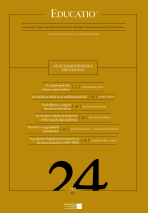Vannak-e tanárok?
Have we Got Teachers?
Author(s): Péter Tibor NagySubject(s): Education, Sociology, Sociology of Education
Published by: Akadémiai Kiadó
Keywords: teaching profession; professionalization; study subjects; symbolic universe; empirical sociology;
Summary/Abstract: Other studies undertaken by Peter Tibor Nagy – published in previous volumes of Educatio – have proved that the popular word used in Hungarian educational policy “pedagógus” is not relevant as a social category; for, as is well-known from the history of education, not only do “tanítók” (elementary school teachers) and “tanárok” (secondary school teachers) form very different social groupings but the social difference between teachers of 10-14 year-old pupils and those of 15-18 year-old pupils has not shown any alterations in the last few decades. This paper goes further: it proves that the socially “highest” groups of teachers do not represent a “profession”. In the case of professions – like medical doctors or lawyers – every member of the profession has a university degree, but only two-thirds of secondary school teachers have finished university. The different school subjects (English, History, Mathematics etc.) represent different symbolic universes. They have different amounts of cultural capital, network capital, work market opportunities, and private and public life strategies. The “pedagógus” or the “teacher” and even the “secondary school teacher” point to an over-diversified social category that make them unusable as the name of a profession.
Journal: Educatio
- Issue Year: 24/2015
- Issue No: 1
- Page Range: 3-12
- Page Count: 10
- Language: Hungarian

